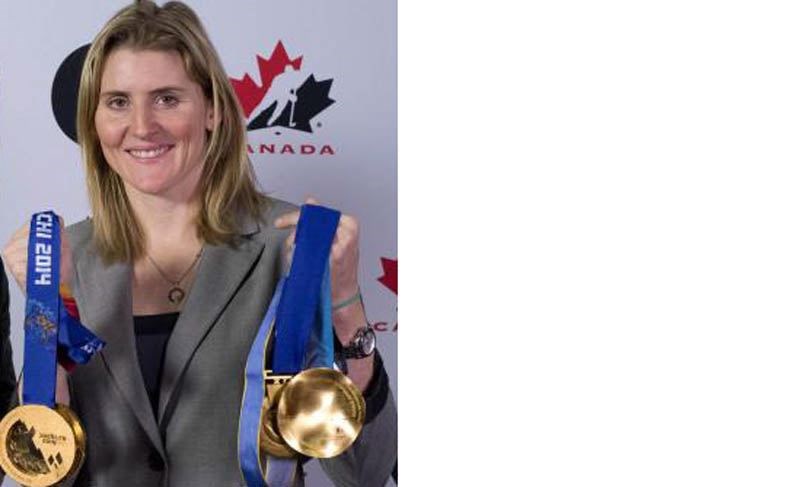Hayley Wickenheiser had a standing ovation before she opened her mouth.
And when she did, the four-time Olympic champion started with a familiarly Canadian story to the sold out crowd Tuesday morning at the UNBC Timberwolves legacy breakfast.
Born in a small Saskatchewan town of 2,000 people, Wickenheiser learned to play in a backyard rink built by her parents.
But that's where many of the similarities end as Wickenheiser went on to become one of Canada's best hockey players, later named MVP at the 2002 and 2006 Winter Olympics.
The signs of success were there early on. At 12, she won her first championship at the Canada Winter Games. As one of the top athletes, she was also drug tested.
"I didn't know how to pee in a cup," said Wickenheiser, now 36, who sat as she spoke, with her foot in a cast, only now recovering from surgery to treat a broken foot from blocking a shot back in 2012.
She compared Prince George's experience with the Games, both for the athletes and the community, to the international event.
"It really is a mini Olympics for athletes," she said. "For me, that's where I got my start."
While other medals are tucked away in boxes, that first Canada Games gold still sits in the sunlight, alongside the Olympic medals.
"That one stands out to me."
Wickenheiser peppered her talk with amusing and touching anecdotes.
There was the time her 14-year-old son tried to pawn her gold medal on the reality TV show Pawn Stars. They offered $40,000, a little too low for her son's asking price of $100,000.
Or remembering tears in legendary hockey coach Pat Quinn's eyes after the Canadian women fought through eight straight penalties to win a game.
Or making the kilometre-long trip to the dining hall in Sochi on a scooter because of her broken foot, as a bemused Sidney Crosby watched. Later, she laughed, he was asking to borrow it.
She avoided walking as much as she could, but that didn't stop her from stepping on the ice.
Wickenheiser told the athletes seated in the room that her secret to leadership is simply to lead by example.
"You have to make tough decisions," she said, adding a captain has to be prepared to be unpopular.
The road to her most recent gold medal - at the 2014 Sochi Olympics - was riddled with setbacks. In the grueling six-months before the Olympics, their schedule was packed with 60 games. The team lost more than it ever had before. Most players had injuries and three months before they left for Russia, their coach quit.
"It really rattled our team," said Wickenheiser.
Enter Kevin Dineen. Recently fired from the Florida Panthers, he entered the dressing room, shook each woman's hand, and told them "a hockey player is a hockey player."
He didn't know any of their names that first day, but he turned the ship around, she said. He also made them tape their names to their helmets, like little Timbit hockey players, Wickenheiser remembered with a laugh.
But the team had perseverance. She said that mental toughness and fitness was hammered into them. One clear example was during a training camp in Penticton where the players were given terrible bicycles and was challenged to ride them to the top of Apex Mountain's 2,180-metre summit.
"I think it really is about preparation," said Wickenheiser of winning the gold medal game in Sochi.
In the dressing room between the third period and overtime, after Canada clawed its way from to a 2-2 tie with minutes left in the game, the team turned to their training.
"This is our Apex Mountain."
The greatest athletes are the ones who are the most resilient, she said, adding those skill transfer into an athlete's approach to daily life.
"It's an intangible thing," she said of sport.
To her, the Olympics are still a tangible goal, and Wickenheiser said she has one more in her.
While there isn't one thing that motivates her, she said she looks for daily inspiration by surrounding herself by people she can learn from.
"I always think I can get better."
She spoke at the Timberwolves legacy breakfast, organized as as fundraiser for student athletes. UNBC president Daniel Weeks said the goal was to raise $12,500, with the university pledging to match any funds raised. Weeks kicked off the giving with his own $1,000 after noting the the four vice-presidents each donated $250 each.



